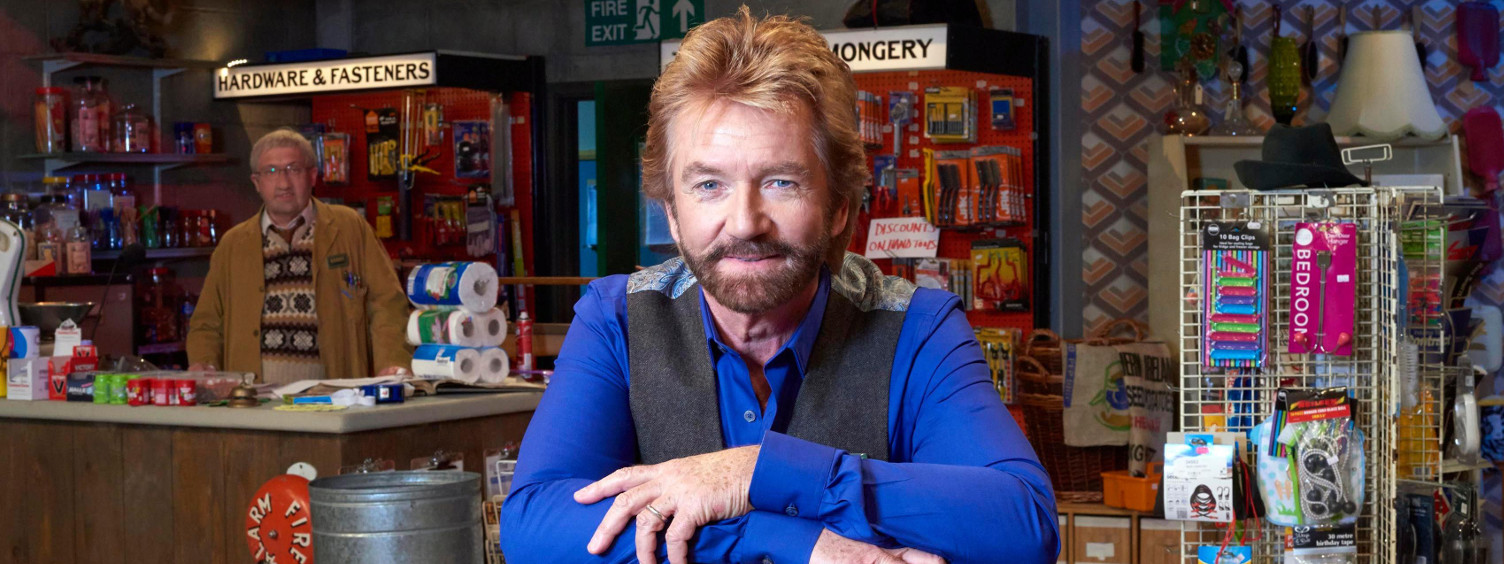
It isn’t a game show crossed with a sitcom, of course.
Oh, Hat Trick might have tried to sell it like that. It was the line used in all the pre-publicity. But the word “sitcom” simply oversells the narrative element of Cheap Cheap Cheap. If people really tuned into the programme expecting a sitcom, no wonder they were disappointed with what they saw.
* * *
So, if it isn’t a game show crossed with a sitcom, what exactly is it?
The format of Cheap Cheap Cheap – at least ostensibly – is as simple as you can get. Noel Edmonds owns a store, and invites contestants to guess the cheapest of three items taken from the store’s stock. Get it right, and you climb the money tree up to a maximum prize of £25,000; get it wrong, and you go home with nothing. You also have three lifelines – sorry, tools – ‘See the Next Question’, ‘Reveal Price of an Item’, and ‘Remove Most Expensive Item’.
Noel is helped by the rest of the shop staff: manager Barry (of Angelos & Barry fame), Marijana the health and happiness guru, Keith the odd job man, and Kelly the sales assistant. At various points they’ll bring out the items and do various bits of comic business. That’s literally it.
And yes, at first it just didn’t seem like enough, and my mind immediately started over-complicating the format. Surely, just figuring out the cheapest of three items shouldn’t be all there is to the show? Maybe introduce other pricing games, à la The Price is Right: pick out the cheapest item one round, the most expensive the next round, perhaps guess the incorrect price the round after?
Here’s the thing: I was entirely wrong. This would have absolutely ruined the show. For a start, I grew to love the actual game itself: figuring out which item is the cheapest has the all-important shoutability factor. When some contestant is getting confused over some patently obvious cheapest item, I was screaming at the TV. On a purely visceral I-can’t-believe-these-idiots exist level, it’s far more fun to get annoyed at someone who you wonder how the hell they manage to do a weekly shop, rather than someone who has the temerity not to be particularly good at the periodic table.
And with the harder questions, the great thing is that Cheap Cheap Cheap rewards deduction. This isn’t just whether you happen to know something esoteric or not, or how fast you are on the buzzer. There’s actual, genuine debate to be had here. Oooh, that item looks quite sturdy, that must cost a lot. That one’s a cheap make, surely it must be that. And so on. What sounds like some silly throwaway game can end up being really involved. I got sucked in, anyway. I cannot vouch for those who sat there with their arms folded and refused to throw themselves into the fun.
But most importantly: the joy in the show is the ultra-simple format, upon which various interactions with our regular shop cast can happen. With a more complicated game, the additional distractions just become annoying: think The Adventure Game at its most indulgent.1 Cheap Cheap Cheap is the simplest game in the world, and that gives the clarity needed for the show to dick about.
And dicking about – as we shall see shortly – is what Cheap Cheap Cheap is best at.
* * *
I have to admit: despite its simplicity, there are some problems with the format.
For a start, the design of the money tree is incredibly odd, with the small leap between £5,000 and £7,500 looking more and more like a mistake with each passing episode. There just simply isn’t the jump in money to reward contestants taking the risk to go past the £5,000 mark.2 Even more peculiar was the option to win an extra £1000 if one of the contestants agrees to play the round solo at £5000 – exactly why were the production so keen to clog up the board around the midway point and make contestants unwilling to play further? Surely the prize money wasn’t a particularly large expenditure compared to what the rest of the series cost?
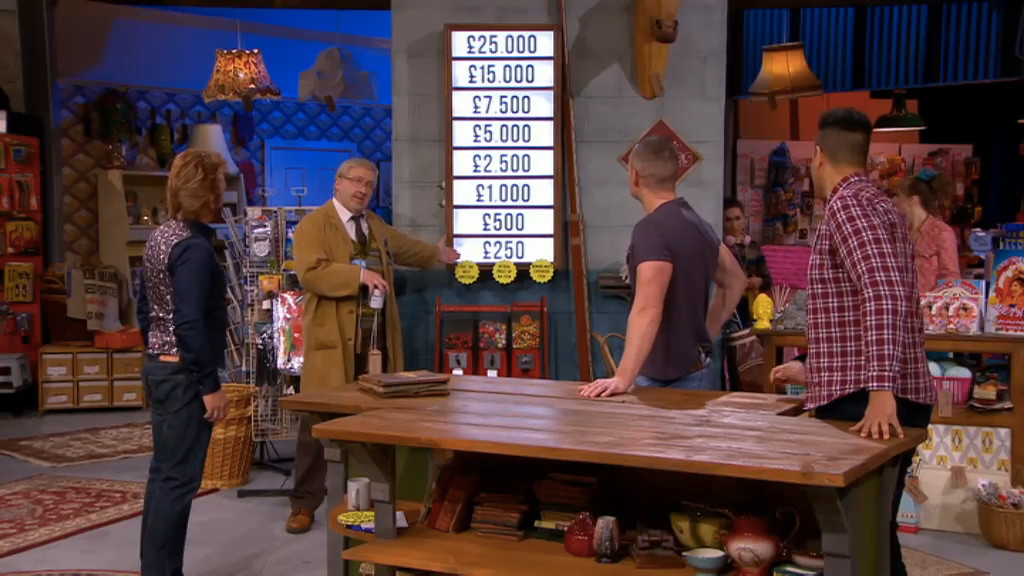
Then there’s the ‘See the Next Question’ tool, which just feels like it adds messiness to an otherwise simple format. The other two tools are played during a round – but this one has to be played before a round. That might not be wrong, per se, but it sure as hell doesn’t feel right. Even worse are the bizarre rules once the tool has been played and the items are brought out: the contestants only get to see the items, not learn the usual extra information on them that they would under normal play. On more than one occasion Noel physically steered the contestants away from looking properly at the items at all. This is just wrong: the tool should allow you exactly the same access to the items that you’d usually have, just with the option not to play at the end of it. Anything else just feels like the game isn’t playing fair.
The temptation here is just to replace ‘See the Next Question’ entirely. Perhaps with ‘Replace All Items’, allowing the contestants to entirely get rid of a round they didn’t like. Or hell, why not just ‘Ask the Audience’ – but instead of keypads, the contestants are just allowed a good old chinwag with the other players. Ah, but are the other players trying to help, or do they just want to get rid of the current contestants so they can have a go at the game? (That feels like a fun avenue the show could have gone down, but perhaps risks being a bit too unpleasant and ruining an otherwise feel-good show.)
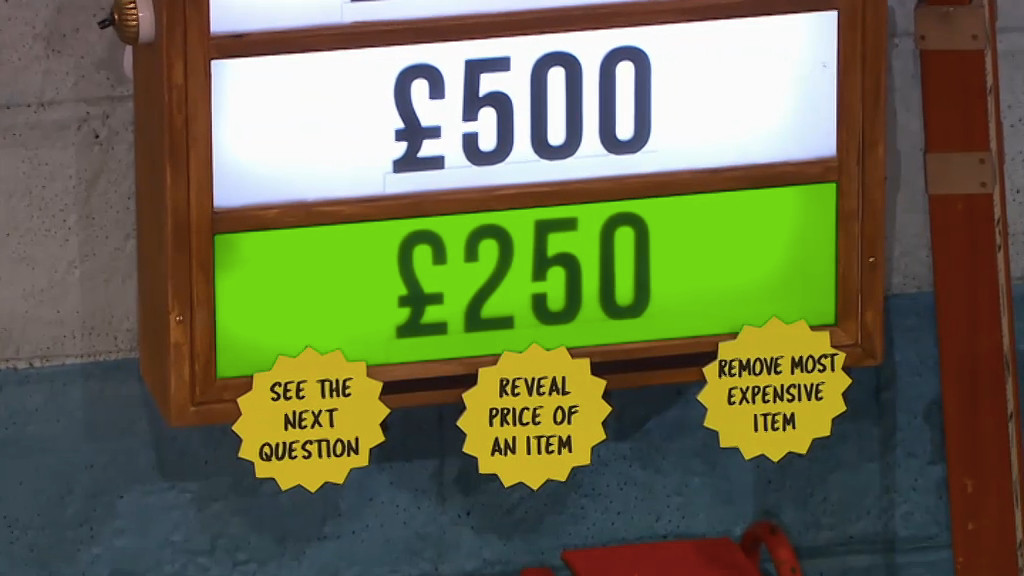
Perhaps the bigger argument here is whether the dynamics of the show should have been fundamentally changed, and contestants should just always have been allowed to see the next items and had the opportunity to walk away… along with a more aggressive money tree to tempt them to play. At first, this felt the obvious way the game should have worked to me, but the more episodes I saw, the more I wonder whether that might cause its own game balance issues.
Then there’s the simple matter that when the tool is played, contestants just walking away was ludicrously unsatisfying, as there was no proveout as per Deal or No Deal where we get to see if they made the right call. Of course, Deal or No Deal‘s proveouts were always suspect: the combination of not knowing if the player was really choosing the boxes they would have chosen, and the Banker offering highly inflated offers, made that the least effective part of the show. But with Cheap Cheap Cheap there would have been no such problems: the contestant’s guess would be more trustworthy here, and there’s no Banker playing silly buggers, just Actual Facts on the label. It’s notable that the one time when a proveout round was absolutely vital to have – with both contestants disagreeing as to whether to play or not – Noel threw the format to the winds, did an impromptu proveout round anyway, and got great television out of it. This should have been the default mode of the show.
I could go on – we haven’t even got into the fact that the difficulty of the rounds seemed suspect at times. Some were ludicrously easy, some were ludicrously hard, and the hard ones didn’t always show up in the later stages of the game. More than one team was surprised with a nasty question in the first round, and left with nothing. But you get the idea. And while at least some of the above is up for debate, it’s fair to say that most people I’ve talked to felt the format needed tweaking a tad. If the show had got a second series, it almost certainly would have had a bit of straightening-up.
Sadly, it never got the chance.
* * *
The phone goes in Noel’s store. Barry picks up. “Your records show I was recently involved in a car crash? I’m involved in one now, it’s called Cheap Cheap Cheap…”
One word which you might not expect to crop up when discussion Cheap Cheap Cheap is “dangerous”. And sure, I don’t want to overstate my case here. And yet… at times, the show really does go into some unexpected areas. Yes, there’s the odd extraordinarily rude joke: Barry getting a thermometer confused with a massive glass dildo isn’t the kind of joke which is common on daytime television, and nor is getting Lionel Blair to play charades where the second word is “off”. Perhaps even more subversive was a conversation about other afternoon game shows: just as standard practice on the radio is that other radio stations don’t exist, game shows are supposed to exist in their own similar bubble. But when Barry point-blank asks one of the contestants “Why didn’t you just go on Pointless?”, I get a little thrill. The safe example to use there would have been Countdown: another Channel 4 show, and entirely non-threatening in its gentle ratings decline. But to bring up Pointless – a behemoth of a programme, sitting pride of place on the BBC… it’s unusual, to say the very least.
Or perhaps there’s the times when the show gets political – again, a rather atypical thing for an afternoon game show to do. Barry informing us that he just votes Lib Dem as he’s not really into politics might be an old joke, but it gets points for being here, rather than on a show where you’d expect it. More out-there is Marijana calling Theresa May ‘a wisdom tooth in a suit’: “There in the background causing pain for years, but now she’s really flared up, hasn’t she?” Rude jokes about the prime minister aren’t exactly standard fare for afternoon game shows.
Here’s where we come back to that supposed “game show crossed with a sitcom” element: because this stuff isn’t sitcom. A better comparison would be a sketch show, or perhaps even character stand-up: someone walks in, does something funny, and walks off again. Which, to be fair, entirely suits the show: I’m not sure it’s possible to combine a sitcom and a game show in a way which would remotely make good television. The comedy in Cheap Cheap Cheap works extremely well, but you don’t want to have to stop and do story stuff.
What you want, in fact, is a load of dicking around. Which Cheap Cheap Cheap absolutely excels at. So while most shows will just go to a break with a standard piece to camera from the presenter, Cheap Cheap Cheap will come up with endless stupid reasons that the show has to stop for a few minutes. One of Noel’s swans has escaped and he needs to get it back. Marijana wants to do an “emotional smear test” with the contestants. Once, a cameraman needed the toilet. That kind of thing.
Or take something as simple as an end of part bumper. Surely the show can’t be bothered mucking about with those?
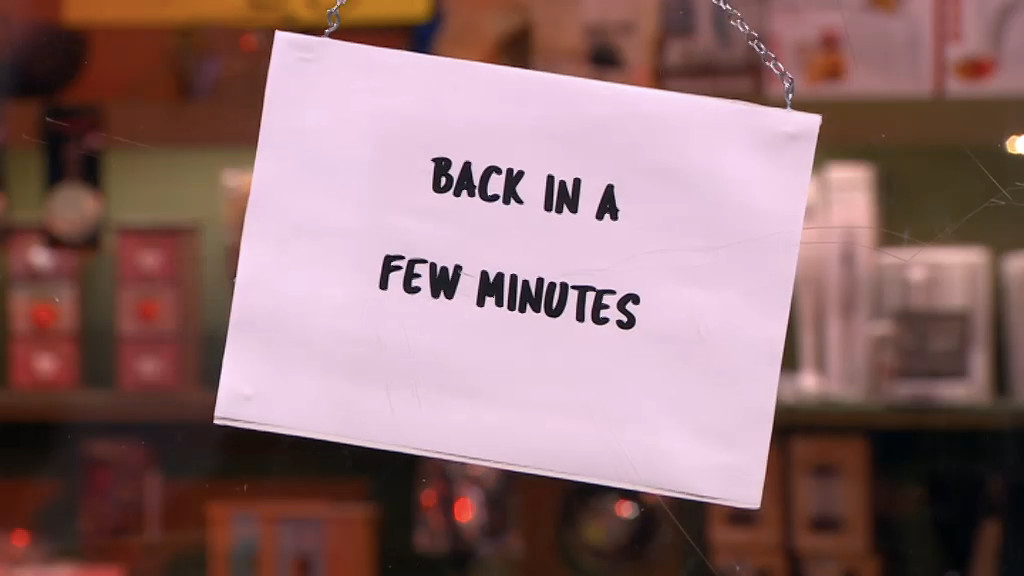
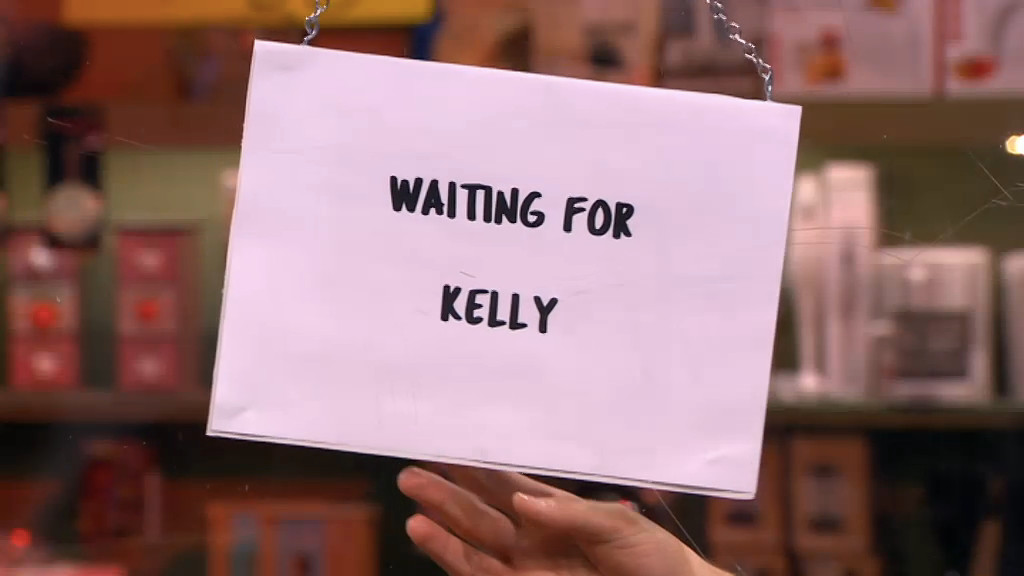
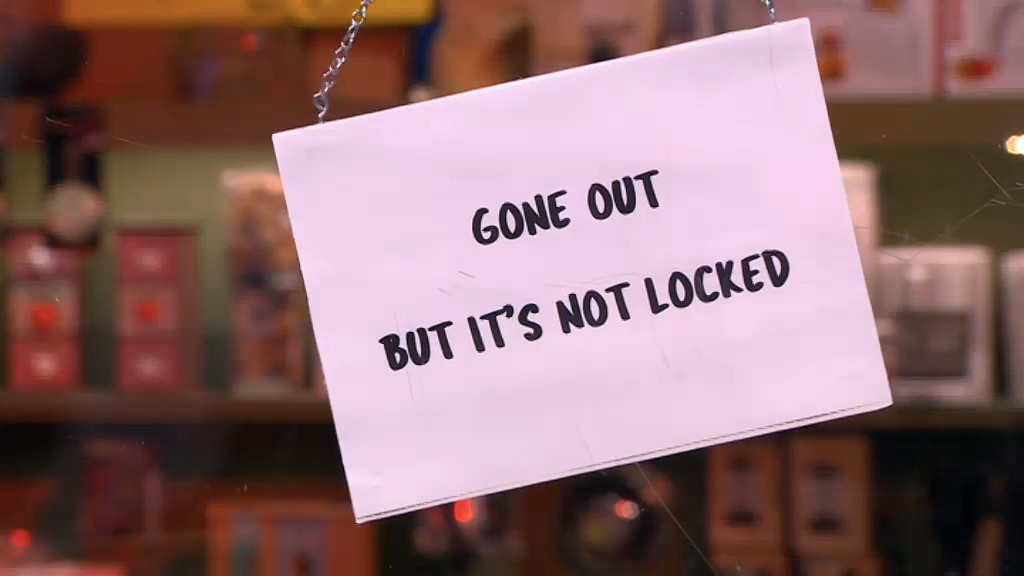
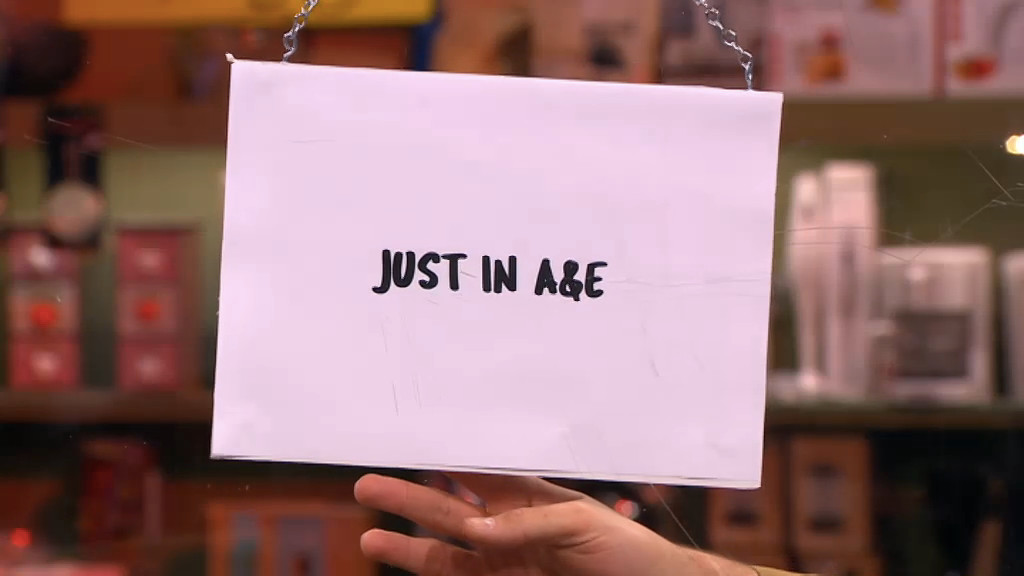
That’s the fun thing about Cheap Cheap Cheap: beyond the simple game itself, anything else is up for grabs. And here we come back to what Deal or No Deal was so good at: bringing a sense of theatre to proceedings. Your typical afternoon game show – whether it’s a good one or a bad one – is utterly rigid when it comes to format. Hell, they have five of the things to bang out in a day – that machine works best when you’re effectively doing the same thing over and over and over again. To do something different needs thought, and in some cases real money. On those themed weeks on Deal or No Deal, where every single contestant wore something silly – just imagine the behind-the-scenes effort to make that happen in terms of make-up artist and costumers that took.
Cheap Cheap Cheap rarely did anything which cost much money – bunging Bobby Davro a fiver to come on and be stupid for a few minutes was probably the limit. But a similar thing applies. For anything to happen beyond the usual takes a bit of production effort. And Cheap Cheap Cheap did endless odd things. Just when you thought you had the measure of the show… it’d briefly turn into a Gogglebox parody. Or have the horse’s head on the wall interject a crap joke. Or we’d take a peek into the staff room to see what was going on. For a show with such a simple format, it’s notable that you never quite knew exactly what the show was going to do next.
I admit I’m biased. In my job I’ve watched an awful lot of daytime television in my time… and you just get to the point where you’re begging for a show to surprise you. Cheap Cheap Cheap went out its way to do this. Maybe it just irritated some viewers at home, I don’t know. But I’m at the point where it’s such a blessed relief for a show to put some real effort into being odd rather than doing what it’s “supposed” to be doing.
And at the centre of all this controlled chaos is Noel. Not the Noel who talks about how positive thinking can cure cancer, or the Noel who ponders buying the BBC, or the Noel who yells at people from the council. It isn’t even the Noel who screams “Not good enough!” at Deal or No Deal contestants, as their perfectly reasonable decision to leave the game is “proved” to be incorrect. This is the warm, friendly, engaging Noel. You know the one I mean. The one who is, in fact, the perfect television presenter.
In a world where Dan Walker has just been given his own afternoon game show – surely a nice enough man, but it’s fair to say that hosting game shows isn’t his strong point – I make no apologies for thoroughly enjoying Noel Edmonds on Cheap Cheap Cheap. If brilliant quiz show hosts were ten a penny, I’d weed out the ones who had said fucking stupid things and put them in the bin. But instead, we live in a world where Warwick Davis presents Tenable. I will grab the good hosts, hug them and love them, and stick my fingers in my ears where appropriate when they’re being ridiculous.3
* * *
Finally, if you’ll allow me to be a little pretentious, Cheap Cheap Cheap has one other thing going for it.
Let’s flick round the other channels at 3pm, during Cheap Cheap Cheap‘s initial run. Oh, what’s this on BBC One? Why, it’s Escape to the Country, with its endless tales of rich people spending ludicrous amounts of money on expensive houses. That was bad enough when it started in 2002; today, I find it revolting. Fair enough that they do it, I suppose, but I don’t want to bloody see it.4 Cheap Cheap Cheap might be a silly game show, and a vessel for a bunch of people to fuck around and make us laugh, but the ultimate gameplay goal – to pick the cheapest of something – feels… comforting, somehow. Your television telling you: hey, it’s OK that you care what the cheapest of something is. That it matters.
It’s perhaps no coincidence that one of the biggest moments in the whole series rested on the classic question asked of politicians: just how much is a pint of milk? And just as politicians need to know people find that important… it’s nice when television acknowledges it as well.
If you never saw the show – or feel like giving it a second chance – every single episode is available on All4. I can’t guarantee you’ll take to it in the same way I did. But you might just be surprised. It’s worth it if only to see what happens when television gives itself a stretch and tries something new. And regardless of whether you like these particular results or not, I wish TV did a little more stretching every now and again.
And if you get to the end… that moment in the final episode: a fix, or not?
That fucking aspidistra. ↩
My suggested money tree for the series: £250, £500, £1,000, £2,000, £5,000, £10,000, £20,000, and £50,000. No idea how this would work budget-wise for the series, mind. ↩
Of course, Noel also created the series too. His penchant for dicking around is all over the show. ↩
No, it’s not aspirational. I might go with that if there was any chance in hell at some point I might be able to afford a house like that. I will never be able to. It’s just rubbing it in. ↩
